A year on from the launch of its first fully electric excavator, JCB is maintaining its twin-track approach to powering its machines. In parallel with the development of new electric models, the company has restated its commitment to diesel power.
“In a rapidly changing world, we need to be quick to respond to the environmental challenge,” JCB chief innovation and growth officer Tim Burnhope said at the European launch of its newest equipment in June. “But the message remains the same: we need clean construction machines that run on clean power – which includes clean diesel and electric.”
Last year JCB unveiled its first electrically-powered equipment: a range of access platforms and the 19C-1 E-TEC mini excavator. This 1.9-tonne machine has now gone into full production, powered by either three or four lithium-ion battery packs providing 15kWh or 20kWh of energy storage, which should be enough for a full working shift for most mini excavator customers.
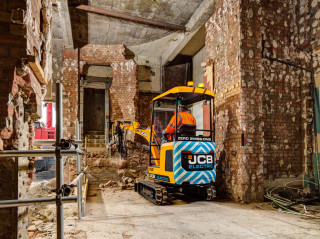
“In urban environments, contractors are keen to operate zero emission equipment wherever possible,” explains Burnhope, who says JCB has used the time since the machine was launched last year to give customers the chance to evaluate it before going into full production.
He insists that it’s not a gimmick, explaining that all the performance features of the original diesel-powered 1.9-tonne mini have been kept, but the electric power makes it five times quieter than its diesel counterpart.
The machine comes with both 110V and 230V charging, and JCB says a fast charge option will soon be available. The 230V 16A supply requires an eight-hour charge time from empty, and the 110V supply needs 12 hours. The batteries have been designed to last the entire operating life of the machine.
Burnhope believes there are many applications where contractors are keen to use low noise and emission-free excavators, including factories, tunnels and basements, as well as tight urban sites. “We are very excited about the opportunity for this machine,” he says.
At the same launch event, JCB also announced that it is about to go into production with an electric version of its Teletruk telescopic forklift, the 30-19E. Until now, JCB’s Teletruks have been powered by diesel or LPG and used predominantly in outdoor applications. The new electric model, powered by an 80Vt lead-acid battery, is designed to work equally as well inside buildings as outside.
“This is our first electric telescopic machine, and I’m sure it won’t be the last,” says Burnhope.
While this suggests we can expect JCB to add to its electric range, the majority of new machines coming out of the factory are still diesel-powered, and the firm has been developing new engines to meet the latest EU emissions standard, Stage V.
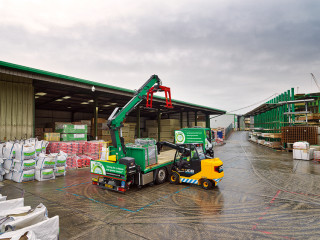
“We have achieved a lot in a short time with electric technology, but there are also exciting developments with diesel,” says Alan Tolley, the company’s group director for engines. “Our mission is to provide customers with the best tools for the job using the best available technologies in the most efficient way.
“We are 100% committed to playing our part in minimising environmental impact in the manufacturing process and in use on the job site,” he says, adding: “JCB firmly believes the internal combustion engines will continue to play a lead role in powering construction equipment for the foreseeable future.”
Tolley considers JCB’s diesel engines to be “part of the environmental solution, not part of the problem”, and says the company has been focused on developing engines that achieve the Stage V standards for particulate matter and NOx for a long time. The result is a compact 3-litre engine that will be fitted to mid-range JCB machines including the 531, 535 and 540 Loadall models, 3CX backhoe loaders, large platform skid steer and compact track loaders, 6-tonne to 9-tonne site dumpers and 13-tonne excavators.
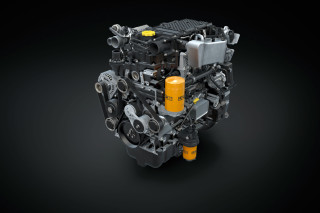
The four-cylinder DieselMAX engine is 24% smaller and 30% lighter than its predecessor – JCB’s own 4.4-litre EcoMAX – but has 10% higher torque output and uses 5% less fuel. The diesel particulate filter (DPF) and diesel oxidation filter (DOC) are combined in a single unit.
Burnhope says the engines are part of the company’s “journey to zero emissions”. “Having our own engine factory gives us a huge advantage,” he says. “But where they are by a third party, we expect our suppliers to step up their game in exactly the same way.”
JCB has swapped engine suppliers for its 457 wheeled loader, moving from MTU to Cummins, which already supplies the engines for the 427 and 437 models. Engines in the small wheeled loaders – the 407 and 409 – are JCB diesels manufactured by Kohler, which also power JCB’s mini excavators. All the machines are getting upgrades to go with the Stage V engines.
Backhoes hit the road

JCB is tackling the highways maintenance market with a new version of its popular 3CX compact backhoe loader. The Highways Master has been developed over a three-year period with customers in the road maintenance industry, including Australian infrastructure contractor Downer.
“The roads and highways maintenance market is crying out for smarter, more efficient road maintenance equipment,” says JCB group engineering director Mick Mohan, who says the 3CX Highways Master “has the potential to transform the way highway maintenance operations take place”.
The purpose of the Highways Master is to enable activities that would traditionally have been carried out manually to be done by equipment mounted on the machine. So it is equipped with a skid steer loader quick hitch on the front loader arms and a SMART attachment integration system, to make it easy to carry out a range of tasks with buckets and a wide variety of specialist attachments. These include 600mm road planer attachments, allowing the machine to be used for larger resurfacing works, replacing standalone road planing equipment.
It also has an optional hydraulic quick hitch on the rear boom, so it could be fitted with a 300mm planer on the rear, as well as a 600mm front planer attachment. Powerslide side-shifting capability at the rear also allows an operator to mill a square patch without having to reposition the machine, enabling a cross cut within a single carriageway without requiring the use of hand tools.
The Highways Master also has integrated water tanks to provide dust suppression to both the front loader and the backhoe attachment, automatically engaging to suppress dust while sweeping or milling. And it comes in a white with red chevrons livery, complete with Chapter 8 safety decals.
An optional external emergency stop button is fitted to the rear wing, to allow operatives outside the backhoe loader to halt the machine if required. It also comes with a periscope mirror to improve front loader visibility, as well as front and rear-view cameras and a tow hitch under the chassis to allow the machine to tow a trailer to site.
JCB describes the 3CX Highways Master as a “one-machine solution” for roads and highways maintenance operations.
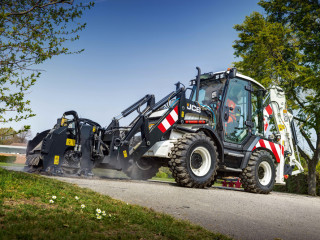
The new Hydraload
JCB’s Loadall telescopic handler range is a mainstay of the housebuilding industry, used for transporting and lifting materials on housing sites throughout the country. But the company realised that, with the growth in off-site manufacturing, housebuilders might need something different.
The government’s aim is to build 300,000 new homes every year to meet the current UK housing need. “That tells us something about the scale of the opportunity, but not about the type of home,” says JCB chief innovation and growth officer Tim Burnhope. “The housebuilding industry is quite traditional and generally slow to change, but it is changing right now, and JCB needs to change with it.”
He says that 15,000 out of 200,000 of the houses built last year were produced off-site, but the rapid growth in modular building means that number is expected to double this year. “That presents our industry with a challenge,” he says. “The equipment required to erect modular homes can be different. To get prefabricated panels in place you need outstanding reach, manoeuvrability, lifting capacity and versatility.”
Burnhope adds that, while “there’s not much the Loadall can’t do”, customers need something very different for modular construction, including heavier lift capacities. The result is the Hydraload – JCB’s first rotating telescopic handler.
The first machine in the new range is the Hydraload 555-210R, which has a maximum lift capacity of 5.5 tonnes and a maximum working height of 20.5m. It includes “auto one-touch” for deploying, stowing and levelling the outriggers, and comes with pallet forks, a 5.5-tonne carriage winch, a 2-tonne x 2m jib winch, a reduced height jib, 5.5-tonne hook, light-duty buckets and a range of fork-mounted accessories, such as waste skips and concrete placing skips. Remote lift operation and access platforms will also be offered.
Rotating, or slewing, telescopic handlers are becoming increasingly prevalent throughout Europe as a cost-effective alternative to small mobile cranes. JCB expects the Hydraload to be popular with specialist lifting contractors and the rental market, as well as with housebuilders themselves.
“Often, construction machines are handling lots of different types of loads, and now they have to lift, move, place and position loads and materials faster than ever before,” says JCB engineering director Richard Brooks. He adds that, while the Hydraload uses proven systems and parts from the Loadall range, the company spent more than three years and 50,000 hours in product development, and another 10,000 hours in testing.
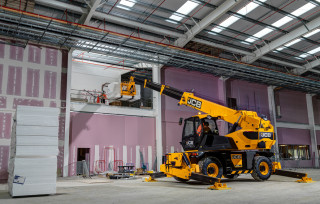
This article was first published in the July/August 2019 issue of The Construction Index magazine
UK readers can have their own copy of the magazine, in real paper, posted through their letterbox each month by taking out an annual subscription for just £50 a year. Click for details.
Got a story? Email news@theconstructionindex.co.uk


